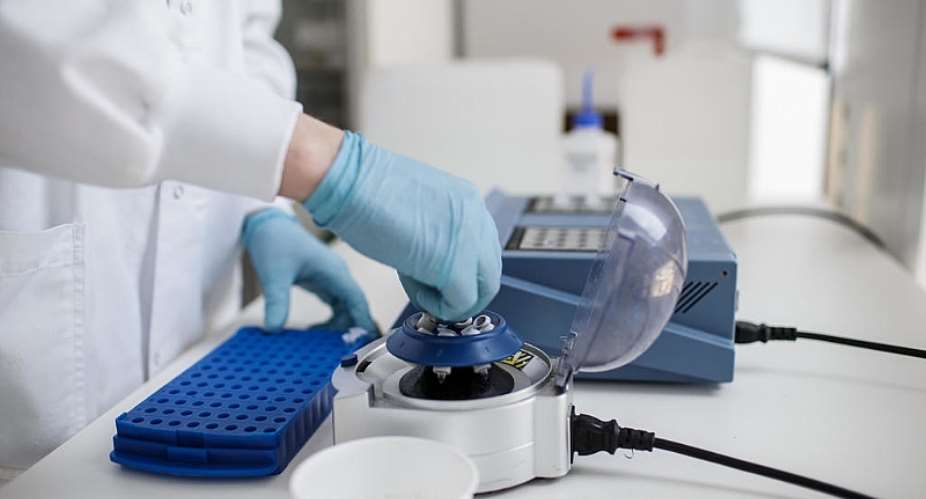The British government has announced it is providing funding for clinical trials of a coronavirus vaccine, one starting this Thursday. Australia, says it is just weeks away from their own human trials, but experts agree that a final product is at least 12-18 months away.
UK Health Secretary Matt Hancock said at the government's daily press briefing on Tuesday that the U.K. is at the "forefront of the global effort" to find a vaccine and will provide financial assistance for the research being conducted at Oxford University and Imperial College London.
"Both of these promising projects are making rapid progress and I've told the scientists leading them we will do everything in our power to support," he told reporters.
The project at Imperial College will receive 22.5 million pounds while Oxford's will be granted 20 million pounds. The Oxford study is slated to start with healthy volunteers on Thursday.
Oxford, where the team is being led by Professor Sarah Gilbert, has said it hopes to have at least a million doses of its vaccine ready in September, while Imperial hopes to start clinical trials in June.
Hancock conceded it was "uncertain science" but said he was confident the UK would throw "everything we've got at developing a vaccine".
Investing in manufacturing
Hancock also said that the government will invest in manufacturing capacity "so if either of these vaccines safely works, then we can make it available for the British people as soon as humanly possible."
The UK currently sits behind Italy, Spain and France in the total number of coronavirus deaths in Europe, with 17,337, 823 people died in hospitals in the past 24-hours.
Trials to begin in Australia
In Australia, several research initiatives to find a vaccine and treatments for covid-19 are underway.
One team, headed by Nikolai Petrovsky, professor of medicine at Flinders University in Adelaide, says they are hoping to start clinical trials on humans within eight weeks.
He told France 24 television on Tuesday that their research ten years ago on animals for the severe acute respiratory syndrome (SARS) virus has provided a good base for research in humans.
Meanwhile, the US-based clinical-stage biotechnology company Novavax will work with Australian based Nucleus Network to commence Phase 1 clinical trials for the first confirmed covid-19 vaccine trial outside of the US.
Nucleus Network says it will recruit a small sample of healthy volunteers who will be injected with some of the virus' surface. The hopes are this will generate an immune response without exposing participants to the live virus.
Infectious diseases physician and microbiologist Dr Paul Griffin believes the trial due to start in Brisbane and Melbourne in the coming weeks, looks "really promising".
Drugs and diagnosis
The Australian health minister, Greg Hunt, said last week that the federal government would provide 3 million dollars for research into treatments and diagnosis.
Some of that funding will help researchers from the Peter Doherty Institute for Infection and Immunity in Melbourne who say they are also just "a few weeks away" from finalising clinical trials involving drugs which would reduce the deadliness of the coronavirus.
The trial, beginning at the Royal Melbourne Hospital will involve recruiting patients who are hospitalized with covid-19 from 70 hospitals in Australia and New Zealand.
"As a 'new disease' there are currently no treatments with established effectiveness for COVID-19. However, there are multiple treatment options, and combinations, that may be effective," according to a media statement released by the Institute on Tuesday.
"Laboratory tests have shown that lopinavir/ritonavir, which is currently used to treat HIV, and hydroxychloroquine, used to treat arthritis and prevent and treat malaria, can stop SARS-CoV-2, the virus that causes COVID-19, in its tracks."
Associate Professor Steven Tong said that while the World Health Organization considers both these drugs to be promising treatments for covid-19, more research is needed to be sure they are safe and effective in humans.
Other trials are in place to evaluate the validity of so-called 'herd immunity' in which individuals' resistance to the virus is spread.





 Former Kotoko Player George Asare elected SRC President at PUG Law Faculty
Former Kotoko Player George Asare elected SRC President at PUG Law Faculty
 2024 elections: Consider ‘dumsor’ when casting your votes; NPP deserves less — P...
2024 elections: Consider ‘dumsor’ when casting your votes; NPP deserves less — P...
 You have no grounds to call Mahama incompetent; you’ve failed — Prof. Marfo blas...
You have no grounds to call Mahama incompetent; you’ve failed — Prof. Marfo blas...
 2024 elections: NPP creates better policies for people like us; we’ll vote for B...
2024 elections: NPP creates better policies for people like us; we’ll vote for B...
 Don’t exchange your life for wealth; a sparkle of fire can be your end — Gender ...
Don’t exchange your life for wealth; a sparkle of fire can be your end — Gender ...
 Ghana’s newly installed Poland train reportedly involved in accident while on a ...
Ghana’s newly installed Poland train reportedly involved in accident while on a ...
 Chieftaincy disputes: Government imposes 4pm to 7am curfew on Sampa township
Chieftaincy disputes: Government imposes 4pm to 7am curfew on Sampa township
 Franklin Cudjoe fumes at unaccountable wasteful executive living large at the ex...
Franklin Cudjoe fumes at unaccountable wasteful executive living large at the ex...
 I'll 'stoop too low' for votes; I'm never moved by your propaganda — Oquaye Jnr ...
I'll 'stoop too low' for votes; I'm never moved by your propaganda — Oquaye Jnr ...
 Kumasi Thermal Plant commissioning: I pray God opens the eyes of leaders who don...
Kumasi Thermal Plant commissioning: I pray God opens the eyes of leaders who don...
